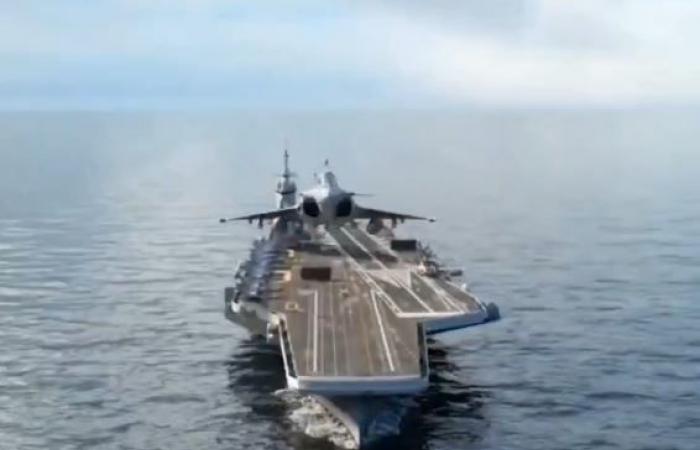According to the finance bill currently being examined in Parliament, the Ministry of the Armed Forces will notify the order of the new generation aircraft carrier [PA NG] to MO-Aircraft Carrier [c’est-à-dire la coentreprise de Naval Group et des Chantiers de l’Atlantique] as well as TechnicAtome in 2025. Which suggests that the conceptual studies relating to this future ship are practically completed and that the technological choices have been made.
According to the latest details revealed by Cols Bleus, the official magazine of the French Navy, the PA NG should display a displacement of 80,000 tonnes [soit 5 000 de plus par rapport à ce qui avait initialement été envisagé] for a length of 310 meters.
However, this additional mass should have no impact on the power that the two K22 nuclear boiler rooms of its propulsion system will have to develop. This must be sufficient to allow it to sail at a maximum speed of 30 knots and to use directed energy weapons, high-power jammers and, above all, electromagnetic catapults. [EMALS] associated with the AAG [Advanced Arresting Gear]that is to say the aircraft recovery device.
A priori, according to the latest images of the PA NG distributed by the Directorate General of Armaments [DGA] and the industrialists concerned on the occasion of the 2024 edition of the Euronaval show, the PA NG should indeed be equipped with three EMALS catapults. Suggested two years ago, this option had not yet been formally confirmed.
In December 2021, the Defense Security Cooperation Agency [DSCA]responsible for exports of American military equipment, had given the green light to the sale of two EMALS and an AAG device to France for an amount estimated at 1.2 billion euros.
Then, a year later, the Pentagon announced that it had awarded General Atomics a $9 million contract to develop a “subsystem comprising two or three launch engines and an AAG device” for the future carrier. aircraft of the National Navy. Which therefore left the door open to a possible configuration with three electromagnetic catapults.
Currently, the aircraft carrier Charles de Gaulle, with its two steam catapults, can theoretically launch a wave of twenty armed Rafale Ms in fifteen minutes then recover and relaunch it four hours later. However, as Cols Bleus explains, the PA NG “must be able to deliver unprecedented offensive air power, thanks to a doubling of the number of air sorties and an improvement in the lethality of the weapons it will carry”. Clearly, we are talking about sixty air sorties per day in a “high intensity scenario”.
Also, in addition to significantly increasing the pace of aerial operations, a third EMALS would provide more flexibility while potentially overcoming a technical deficiency in one of the other two catapults.
As a reminder, an EMALS type catapult uses a linear electromagnetic induction motor [LIM]whose power supply depends on the mass of the device to be catapulted. The magnetic field generated on either side of a catapulting rail will then set in motion a mobile carriage on which the aircraft to be launched is fixed. Given the large amount of energy to be released in a few seconds, it uses flywheels that can store up to 100 megajoules and be recharged in less than a minute.
Compared to steam catapults, an EMALS offers several advantages: mechanical constraints on aircraft cells are reduced, energy efficiency is optimized and maintenance is easier.






